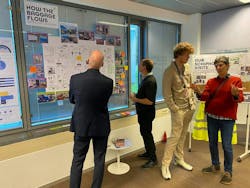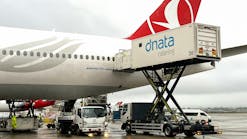Schiphol and KLM Join Forces with Delft University of Technology for the Future of Work in Baggage Handling Halls
Delft University of Technology researchers are launching a study on a new way of working at Schiphol’s baggage handling halls. To conduct their research, they will be working closely with all parties involved in baggage handling. Amsterdam Airport Schiphol, KLM and Delft University of Technology’s research and innovation centre FRAIM are joining forces for eight months to develop new innovations that can change the way we work.
The study aims to help the aviation industry make the work in baggage handling halls lighter, for instance. In addition to the already planned actions to install lifting aids everywhere in the short term, the parties want to investigate how digital innovation can support physical work activities.
In the coming months, five researchers, supervised by professor David Abbink (professor of Haptic Human-Robot Interaction and scientific director of FRAIM), will conduct research in the baggage handling halls. Together with the baggage handlers, they will shape the future of this type of work. Even with the application of digital innovations, the future of this work will still revolve around the balance between humans and machines. The baggage handlers therefore have an essential role to play: their observations, wishes and experiences hold sway.
"We need to learn from the experts in the workplace what is important to them in their work and what they would like to see done differently. The members of our research team have different backgrounds, which enables us to try to expose each other’s blind spots, so that we can learn more together than we would individually. That is essential to be able to explore different possible solutions with and for the experts: technical, social or organisational," said Abbink.
"KLM and Schiphol have long been leading the way all over the world in terms of reducing physical strain in baggage handling. But there’s always room for improvement. By working together with Schiphol and Delft University of Technology, we are taking new steps to make working in baggage areas physically less demanding. This collaboration will facilitate improvements that can eventually be implemented at airports around the world. That’s something we can be proud of in the Netherlands," added Harm Josephi, vice president of baggage services at KLM.
"Every workplace in the baggage handling hall will have a properly functioning lifting aid by April 2024, which must be used by all employees. At the same time, we are also working on the next step for the period after this: automation of physical work. Even in an automated baggage handling hall, employees will still have an important role. We are shaping the future of work and how the role of people will change in it. The study will help us shape that together with employees," Dennis van Kleef, who is responsible for baggage at Royal Schiphol Group, said.
Broad Perspectives
The researchers from various universities who are coming together in TU Delft FRAIM have diverse backgrounds in design, psychology, organisational change, robotics and logistics. This broad perspective allows them to assess the impact of technical innovations early, accelerated by innovation expertise from TU Delft's field lab RoboHouse. The fact that this research is not done in a lab, but rather in the baggage halls with the people who work there, ensures crucial cooperation between baggage workers and researchers, and therefore realistic, actionable outcomes. Schiphol, KLM and TU Delft believe that this approach will really move things forward.
The study will have been successful when a new way of working is developed together with baggage hall employees. If all goes well, the collaboration will become a long-term partnership to make this groundbreaking way of working a reality.
The study being done by TU Delft is part of the plan that all parties involved in baggage handling at Schiphol have presented to lighten the work in the baggage halls. The parties involved will be following through with these plans. Future renovations of the existing baggage halls will be developed using the knowledge and results from the research.




